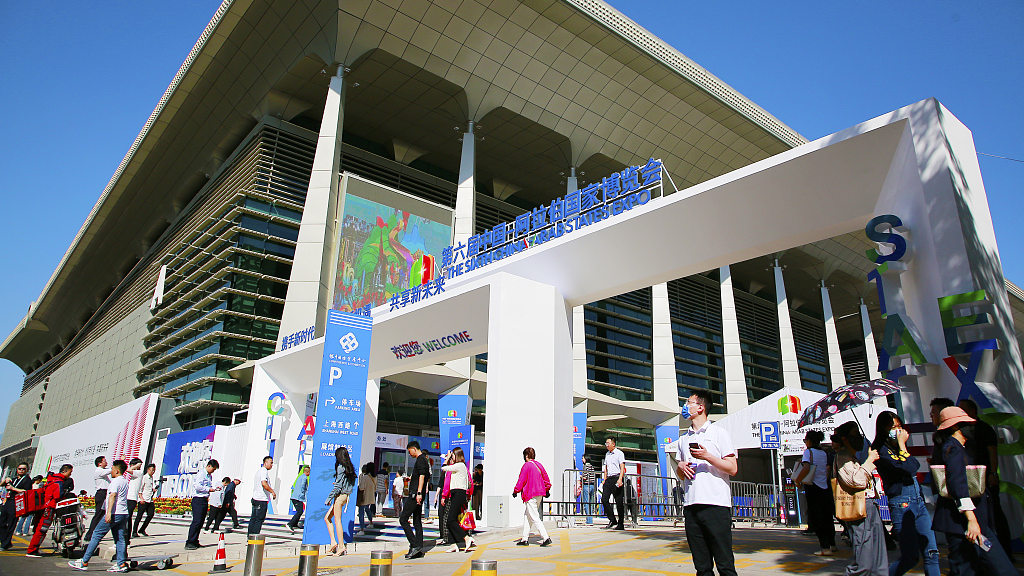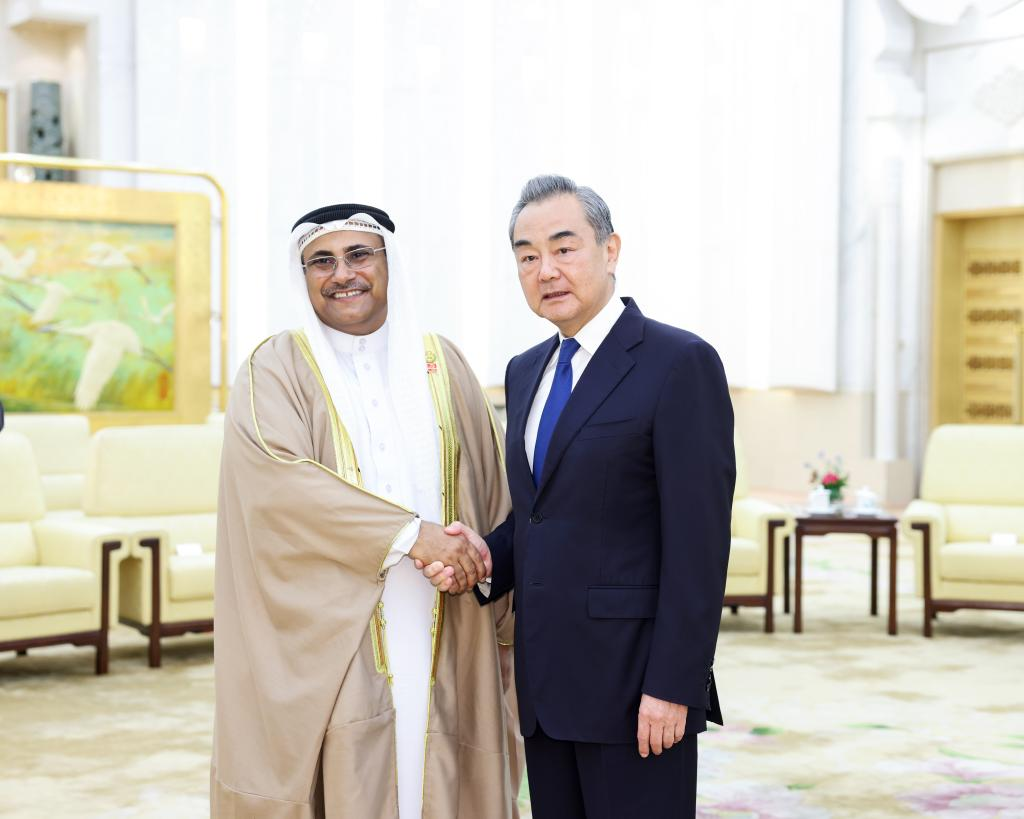
The exhibition hall of the sixth China-Arab States Expo in Yinchuan, northwest China's Ningxia Hui Autonomous Region, September 21, 2023. /CFP
The exhibition hall of the sixth China-Arab States Expo in Yinchuan, northwest China's Ningxia Hui Autonomous Region, September 21, 2023. /CFP
Editor's note: Shahid Hussain, a special commentator on current affairs for CGTN, is the founder and CEO of the UAE-based company Green Proposition. The article reflects the author's opinions, and not necessarily the views of CGTN.
In an epoch marked by the ebb and flow of global dynamics and the recalibration of international alliances, the recent culmination of the sixth China-Arab States Expo in Yinchuan, China, emerges as a resounding testament to the burgeoning significance of Arab-Chinese relations. This rendezvous, drawing envoys from 14 governments, and 13 international and regional organizations, alongside foreign institutions nestled in the heart of China, and over 60 foreign business associations and enterprises, has cast a fresh and invigorating light upon an already thriving camaraderie.
The numbers alone speak volumes. Companies from China and Arab nations signed deals amounting to a staggering $23.4 billion during the expo. These deals spanned diverse sectors such as trade, agriculture, energy, green transition and medical care. This is a testament to the depth and breadth of economic cooperation between China and the Arab world.
The staunch support for China's presence within Arab nations transcends mere diplomatic courtesies; it is rooted in the acknowledgment of China's steadfast adherence to international conventions, laws and norms. Of paramount importance is China's principled stance on non-interference in the internal affairs of other nations. This posture harmonizes beautifully with the aspirations of Arab nations for self-determination and sovereign decision-making.
The sixth China-Arab States Expo, functioning as a conduit for advancing pragmatic cooperation, cast a luminous spotlight on the myriad ways in which China contributes meaningfully to Arab progress. This encompasses investments and active backing for significant Arab undertakings, such as its collaborative efforts with Egypt in constructing the nation's new administrative capital. These ventures spotlight China's unwavering commitment to nurturing sustainable economic development and robust infrastructure in Arab territories.
The expo resonated on a global scale, attracting dignitaries representing more than 60 nations and over 1,000 foreign entities stationed in China, underscoring its profound global import. Beyond the realm of governments, a multitude of foreign chambers, international corporations and Chinese enterprises enthusiastically joined the proceedings, cementing the expo's stature as a central hub for international economic interaction.
A notable hallmark of the expo lay in its ardent emphasis on the exchange of technology and innovation. Eight substantial agreements were consummated between Chinese institutions and research bodies hailing from countries such as Egypt, Saudi Arabia and Qatar. These accords revolved around pivotal concerns like combatting desertification and advancing smart agriculture. Such collaborative forays into technology epitomize the very essence of the contemporary global economy, and it is heartening to witness China and Arab nations harnessing each other's competencies to confront shared challenges.
The gravity of this partnership was underscored by none other than the Speaker of the Arab Parliament, Adel Al Asoomi, who extolled Arab-Chinese relations as possessing "strategic importance." His declaration cast a spotlight on China's exceptional rapport with all Arab nations, underscoring the constructive approach that China espouses in its global interactions.

Wang Yi, a member of the Political Bureau of the Communist Party of China Central Committee and director of the Office of the Central Commission for Foreign Affairs, meets with the Speaker of the Arab Parliament Adel Al Asoomi in Beijing, capital of China, August 29, 2023. /Xinhua
Wang Yi, a member of the Political Bureau of the Communist Party of China Central Committee and director of the Office of the Central Commission for Foreign Affairs, meets with the Speaker of the Arab Parliament Adel Al Asoomi in Beijing, capital of China, August 29, 2023. /Xinhua
Speaker Al Asoomi's pronouncements came hot on the heels of a recent sojourn by a delegation of Arab legislators to China in the waning days of August. Their visit ushered in discussions on inter-parliamentary collaboration with their Chinese counterparts, greeted with palpable enthusiasm and positivity. This effusive reception motivated the delegation to delve deeper into opportunities for bolstering Arab-Chinese relations, with a particular focus on the parliamentary arena.
The Arab Parliament, an integral part of the Arab League, has been a staunch advocate of this Arab-Chinese nexus. Speaker Al Asoomi harbors optimism for the future of this collaboration, envisioning even more favorable outcomes. As the global panorama continues its metamorphosis, the strategic importance of Arab-Chinese relations looms large. In their pursuit of shared goals, both regions stand poised to reap substantial rewards through sustained cooperation.
In a world where traditional alliances are undergoing transformation, the resilience and adaptability of Arab-China relations are conspicuous. Amidst shifting global dynamics, it is evident that China is steadily expanding its footprint in the Middle East, assuming a prominent role in filling the voids left by the waning influence of the United States in the region. China's recent mediation efforts in fostering diplomatic relations between Iran and Saudi Arabia further underscores its ascendant stature as a diplomatic arbiter.
President Xi Jinping's resolute commitment to the establishment of modern agricultural laboratories, the implementation of demonstrative projects and the dispatch of scientists to Arab countries for the enhancement of grain yields serves as a poignant testament to China's dedication to tackling the formidable challenges posed by global food security. In a world grappling with finite resources, such visionary initiatives not only merit acclaim but also emerge as a pressing necessity on the international stage.
In summation, the imperative of fortifying Arab-China relations stands out with unwavering clarity. This alliance, rooted in mutual respect, shared objectives and a steadfast commitment to non-interference, holds immense promise for both the Arab world and China. As they navigate the ever-shifting tides of the global landscape, their collaboration serves as an illuminating exemplar of how nations can come together to achieve common goals and usher in prosperity for their citizenry.
(If you want to contribute and have specific expertise, please contact us at opinions@cgtn.com. Follow @thouse_opinions on Twitter to discover the latest commentaries in the CGTN Opinion Section.)